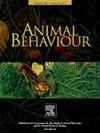Mate choice copying behaviour in the livebearing fish Brachyrhaphis rhabdophora
IF 2.3
2区 生物学
Q2 BEHAVIORAL SCIENCES
引用次数: 0
Abstract
Reliance on social learning for mating decisions (i.e. ‘mate choice copying’) is taxonomically widespread and can influence the strength of sexual selection in a population. Theory suggests that a balance of social and individual learning, as well as stable individual behaviour in the propensity to copy mate choices, may help maintain variation in mating preferences within a population. Here, we focused on the livebearing fish species Brachyrhaphis rhabdophora to test the role of social information on mate preference behaviour in this species and the stability of copying behaviour within an individual. Female observers underwent a dichotomous choice test between two female demonstrators prior to observing and choosing between two potential mates with or without social information from female demonstrators. We found that B. rhabdophora females displayed strong preferences between males regardless of access to social information. We then retested individuals approximately 1 month later and found that individuals used social information in a consistent manner between trials. Taken together, our data suggest that B. rhabdophora females consider both personal and social information when making mating decisions and that heterogeneity in copying strategies exists among individuals within a population. These findings contribute to our growing understanding of the factors that shape the evolution of socially learned mating preferences.
求助全文
约1分钟内获得全文
求助全文
来源期刊

Animal Behaviour
生物-动物学
CiteScore
4.60
自引率
8.00%
发文量
236
审稿时长
10.2 weeks
期刊介绍:
Growing interest in behavioural biology and the international reputation of Animal Behaviour prompted an expansion to monthly publication in 1989. Animal Behaviour continues to be the journal of choice for biologists, ethologists, psychologists, physiologists, and veterinarians with an interest in the subject.
 求助内容:
求助内容: 应助结果提醒方式:
应助结果提醒方式:


